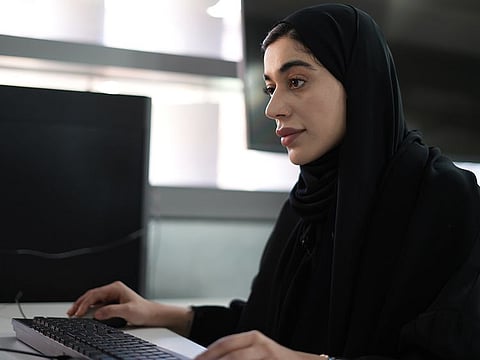Meet the Emirati researcher teaching driverless cars how to read road signs
Fatima AlKhoori didn’t have a background in computer science when she had started out

Abu Dhabi: An Emirati researcher who didn’t have a background in computer science when she started her learning journey has gone on to pursue doctoral studies in enhancing the capabilities of driverless vehicles.
Fatima AlKhoori has been accepted to undertake her PhD at Mohamed bin Zayed University of Artificial Intelligence (MBZUAI) in Abu Dhabi. She previously earned a master’s degree in machine learning from MBZUAI, which she received in June. This is in addition to a bachelor’s degree in transportation engineering from the Higher Colleges of Technology and a master’s degree in sustainable critical infrastructure from Khalifa University in Abu Dhabi.
Fatima has also worked as a Research and Development expert at Etihad Rail — all part of her mission to improve mobility for people and businesses.
“I’ve always had a passion for transportation ... it influences the economy, business, and our daily lives in so many ways. That’s why I feel like it’s my mission to contribute to making the UAE’s transport system the very best in the world,” she said.
Fatima understood the potential of AI-powered self-driving vehicles in easing mobility challenges in urban areas and wanted to master this knowledge and apply it to her goal.
But it was not easy
Unlike many of her peers at MBZUAI, Fatima did not have a background in computer science, which meant several months of intense learning at the beginning of her time at the university.
“When I first started it was very challenging because I had to learn the basics from scratch while most of the other students already had an IT or computer science background.

Making machines smarter
At MBZUAI, Fatima focused her research on the use of machine learning to recognise traffic signs using “transformer model architecture”. There are many reasons that make it difficult for machines to see and comprehend traffic signs properly. For example, the viewing angle, variations in lighting and reflection, shadows, and close proximity to other signs all create challenges.
“The objective of my research was to investigate the different variants of vision transformers and develop a suitable methodology to enhance their ability to recognise signs correctly by eliminating variables,” Fatima said.
Fatima used a dataset of 1,150 traffic signs provided by the Abu Dhabi’s Integrated Transport Centre (now known as AD Mobility), and a German data set containing 50,000 images that is publicly available in a global open-source machine learning data library. The relatively limited set of Abu Dhabi images was a challenge, but the larger German data set proved valuable in helping teach the algorithm to extract the most relevant data from amongst the “noise” and variables.
First comprehensive study
“I’m proud of the fact that this is the first comprehensive study of its type that utilises UAE data,” Fatima said. “We believe we’ve achieved very good accuracy in comparison to other journals and publications that have conducted similar research, and we have found ways to improve the accuracy of recognition.”
Fatima added: “I want to extend my sincere thanks and gratitude to my country and our wise leadership for providing this opportunity to learn and research AI and machine learning,” she said.
“I aim to pay back this trust by using the power of machine learning to solve key transport and infrastructure challenges.”
Sign up for the Daily Briefing
Get the latest news and updates straight to your inbox



